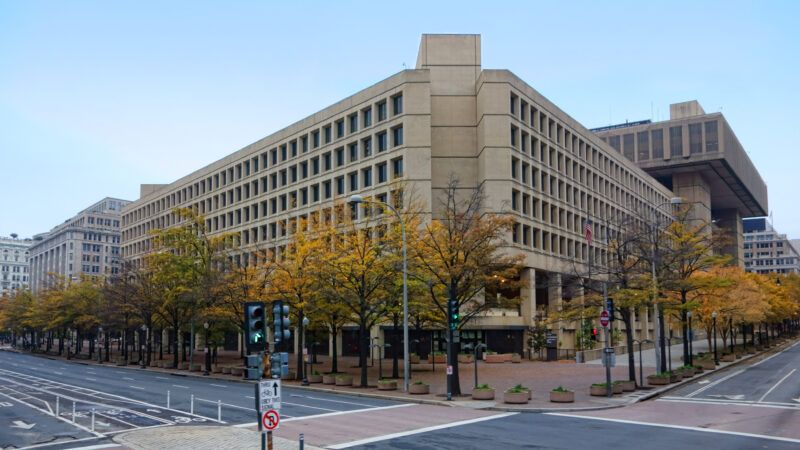The FBI Needs Downsizing, Not $3.5 Billion for a New Headquarters
Lawmakers from Maryland and Virginia fought over which state should house the new site rather than whether the bureau even needs so many agents.

This week, after more than a decade of debate, government officials chose a location for a new FBI headquarters, replacing the J. Edgar Hoover Building that has stood in downtown Washington, D.C., since the 1970s. The new building, which will be located in Maryland, will be able to accommodate thousands of agents and is expected to cost billions.
The government has long advocated for a new building, with the Government Accountability Office (GAO) noting in 2011 that the Hoover building was "nearing its life-cycle age and exhibiting signs of deterioration" and "do[es] not fully support the FBI's long-term security, space, and building condition requirements."
A much more budget-conscious solution, which lawmakers seem not to have considered, would be to simply shrink the size of the FBI.
FBI officials wanted to keep the building in Washington, citing proximity to both the White House and the Department of Justice (DOJ). The bureau even suggested building a secondary facility in Maryland or Virginia to act as "a command center for cyber operations." But lawmakers from those states were unswayed, inserting language into a 2022 spending bill that directed the General Services Administration (GSA) to choose a new headquarters site from three options: Greenbelt, Maryland; Landover, Maryland; and Springfield, Virginia.
On Thursday, the GSA announced that it had chosen Greenbelt, where it would build a new facility in addition to a smaller facility in downtown Washington that could house up to 1,000 agents. The GSA noted that the Greenbelt location is very close to a Metro stop and would involve the cheapest and quickest timeline for acquisition and construction.
Each of the proposed sites had problems: According to an October DOJ inspector general report, the FBI was "concerned" that the Greenbelt site "was half wetlands and the amount of buildable space was far less than what was anticipated when the site was selected." The Springfield location, while most convenient to access the FBI training facility in Quantico, Virginia, "had multiple government agencies…that needed to be relocated, which the FBI believed would be costly, time-consuming, and logistically complicated." FBI officials found all three options lacking, but favored the site in Landover, even though it "had the worst mass transit access," according to the DOJ report.
No matter the site, the new headquarters won't be cheap: In its FY 2024 budget proposal, the DOJ asked Congress for $3.5 billion for the new building, which it says would house "at least 7,500 personnel."
But while lawmakers and government agencies have been arguing over where to house these many workers, they've largely ignored the fact that they could simply reduce the FBI's footprint.
Proponents of a new facility say that the Hoover building is too small to accommodate the size of the current FBI. In a 2011 response to a GAO report, FBI Associate Deputy Director Thomas Harrington noted that the building "houses just 52% of headquarters staff with the remainder at 21 off-site leased locations." Plans for the new headquarters refer to it as a "consolidation" effort intended to bring nearly all agents under one roof.
It's not clear that the FBI needs so many agents in the first place. From its inception in 1908 until the Hoover building opened in 1975, the FBI operated within the DOJ building. During that time, it mostly enforced interstate crimes like banking fraud or forced labor.
Over time, the bureau's mandate has increased dramatically—and excessively. "When the FBI first occupied the Hoover Building, it was primarily a law enforcement organization," the 2011 GAO report noted. "Since then, its mission has grown in response to evolving threats and now includes counterterrorism, counterintelligence, weapons of mass destruction deterrence, and cyber security." As the purview of federal law enforcement has expanded, especially since 9/11, federal agencies have expanded in turn.
Lawmakers have fought for over a decade about whether to consolidate the FBI's massive work force at a multibillion-dollar facility in Maryland or Virginia. They should have been considering a very different issue: how to shrink the expensive and expansive agency.


Show Comments (54)